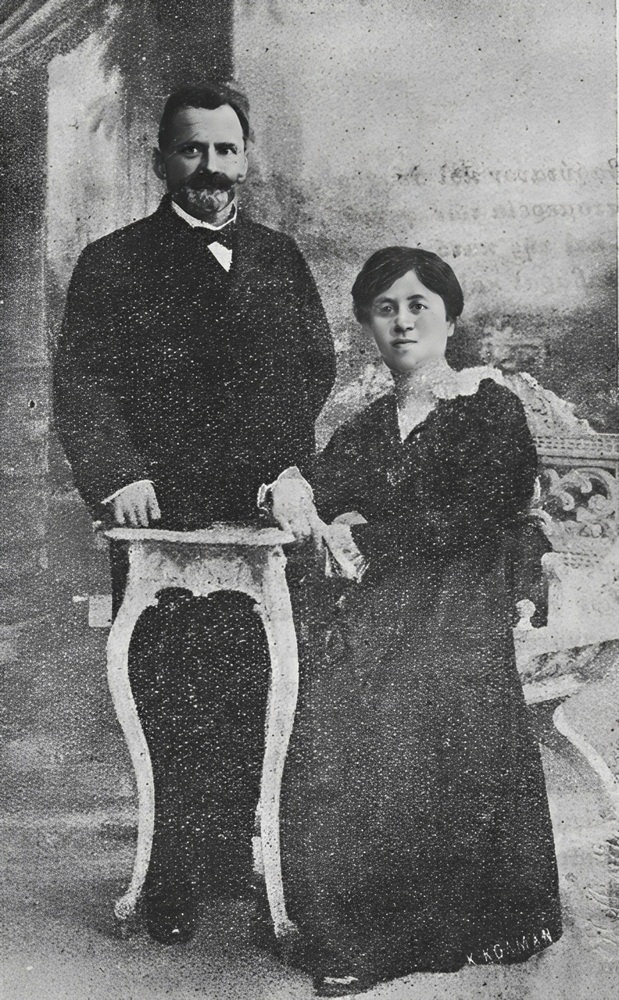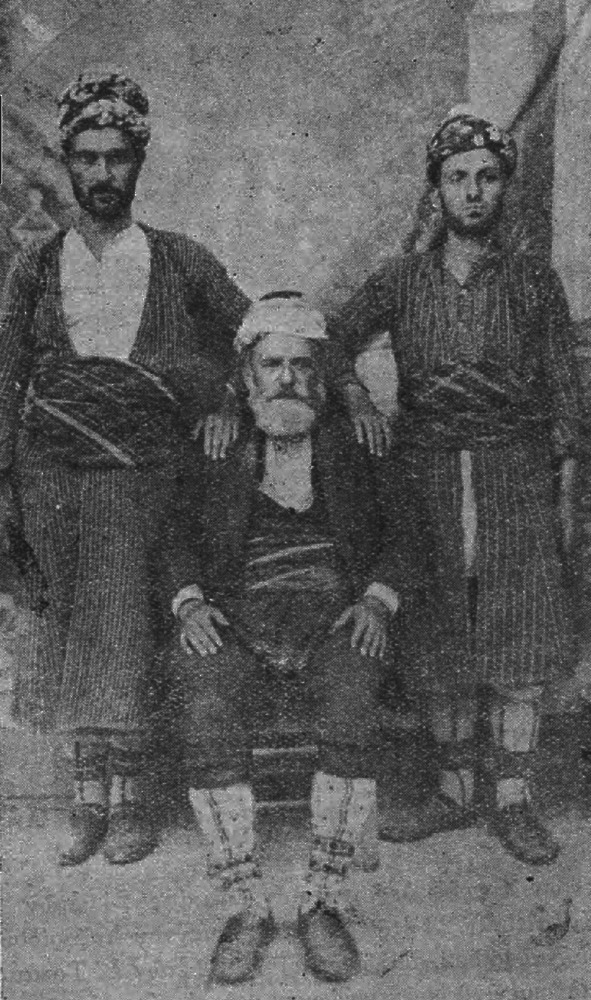
Antonios Gavriilidis with wife Polymnia some time before his relocation.
Antonios Gavriilidis was a tobacco merchant from Bafra in northern Turkey. During the genocide, he was relocated by the Kemalists to Malatya situated 600km deep in the interior of the country. While at Malatya, realising his life was in danger, he along with four other men planned an escape. On the 26th of August 1922, Antonios Gavrilidis along with his two Armenian friends Hosrob Derohanesian and Serkiz Kalaytzian and two brothers Ioannis and Aristidis Lazaridis, made a pact that they would all leave together.
 They found two mule drivers, Hadji Ali, a Turk and Pakash a Kurd. They agreed to pay them 125 gold Turkish lira if they delivered them to Syria, paying half the amount as deposit and the remainder on arrival. To ensure they weren't noticed by authorities, they disguised themselves and adopted Turkish names.
They found two mule drivers, Hadji Ali, a Turk and Pakash a Kurd. They agreed to pay them 125 gold Turkish lira if they delivered them to Syria, paying half the amount as deposit and the remainder on arrival. To ensure they weren't noticed by authorities, they disguised themselves and adopted Turkish names.
They set off from Malatya during August of 1922 accompanied by the two mule drivers and 45 donkeys loaded with merchandise, doing most of their travel by night and hiding during the day. They were captured at one stage by a Kurdish chieftain who threatened to hand them over to Turkish authorities but they managed to bribe him with money.
After numerous days travel, they arrived at Aleppo where they were helped by the local Greek community. They then caught a train to Beirut. From Beirut they boarded a French ship which took them to Constantinople (now Istanbul). Their escape was successful when they arrived in Athens on November 1, 1922. To the right is a photo of Antonios Gavrilidis who is seated middle, with Ioannis Lazaridis to the left and Aristidis Lazaridis to the right, all three men in disguise.
Gavriilidis later wrote his memoir detailing the persecution of Greeks in Turkey during the genocide. The book is titled The Dark National Tragedy of Pontus.
An excerpt from the book:
At the start of the Pan-European war in 1914, Turkey had committed to a general conscription (the so-called Seferbelik) on August 19, 1914 with the following proclamation:
All those between the ages of 20 to 45, genuine descendants of Islam, in other words Muslims, as well as non-Muslims, are called to arms within three days.
The non-genuine descendants of Islam were the non-believers of the Koran, in other words, the [Greek] Orthodox, Armenian and Jewish Ottoman citizens. And immediately, the conscription began without regards to race and religion from the ages of 20 to 45 and the classification of each person to the appropriate battalion.
The first order came after two months when non-Muslims were given the right to pay a military exemption of 44 gold Ottoman lira to be excluded from military duty until the end of the war. Whoever was able to, paid the exemption and was excused, while those who were unable to pay were placed in the infantry, cavalry and artillery battalions and those with certain abilities were promoted into the ranks of captain and lieutenant.
When the Russo-Turkish war started and major general Enver Pasha arrived at the eastern front at Sarikamis near the Russian-Turkish border to direct his military against the Russians, the fierce and decisive battle of Sarikamis took place and the Turks succumbed to a disastrous defeat and the loss of around 90,000 men (Turks and Christians). It was then that the Turkish army officers as well as the hodjas [leader or wise person] in the military admitted defeat but apportioned blame to the giaour [non-believer] soldiers who were fighting under the holy flag of Mohammed. In order to encourage the military and strengthen its morale, they firstly removed all the Christian soldiers and officers from the battalions and then, after disarming them, sent them to labour battalions (Amele Taburu) without recognizing them as regular soldiers, but rather, simply as attendants and workers and they were made to break rocks and build roads during the winter months so that animals and vehicles carrying military equipment could pass through. They were fed and dressed inadequately with the aim of exhausting them and destroying them.
After the catastrophic defeat of the 92nd and 93rd regiments at Sarikamis, the hodjas and army general Enver Pasha made the sinister decision to exclude Christian soldiers from the armed forces and used the Jewish-Turks who arrived at Samsun from Thessaloniki to announce via the mosques and military camps that the presence of Christian soldiers within the holy battalions was not acceptable to God and that they should stir up the hatred and the animosity in the hearts of all Turk soldiers against their up-until-then fellow Christian citizens.
Meanwhile, the well-trained Christian soldiers who had been expelled from the ranks of the regular Turkish army and who were exhausted after doing forced work in the labour battalions and who were unable to withstand the deprivations and hunger, started to abscond and return to their homes. The names of these absconders was soon recorded along with their places of origin and the catalogues were immediately sent to the central administration to enforce the arrest of the draft dodgers and deserters.
But before the unfortuante soldiers returned to their homes, groups of police officers would arrive at the villages supposedly to find and arrest them. The unfortunate parents or spouses were compelled to hand over their sons or husbands who had deserted. But in vain, they protested and swore on oath that the person they were searching for was at this or that labour battalion.
Then, under the pretext of searching the household, the stubborn policemen would wilfully enter the home and with absolute barbarity grab and steal and rape women and virgins and even burn the home down and leave unhindered. After a few days, the soldiers who had deserted would arrive and learn what had taken place and see the destruction and rape of their family members and were thus forced to leave their homes and retreat to the mountains to avoid certain death or the gallows and make decisions to take revenge for the honour of their familes. The same measures were also directed at families of soldiers who had received legitimate permission from an officer of a battalion to leave their rank.
Translated from pages 5-11.



